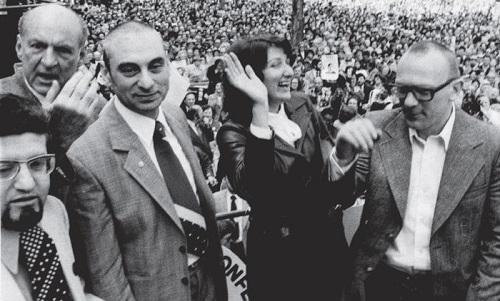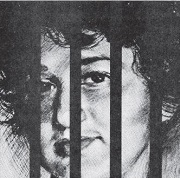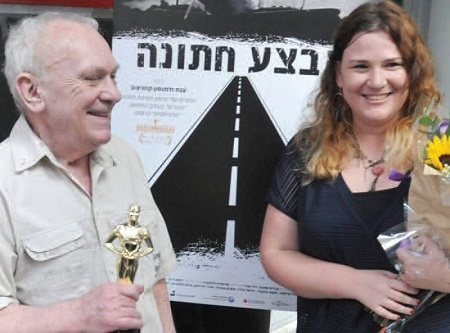‘Did you Know your Parents are Heroes?’
"Ever since I was a little girl, people always asked me: 'Do you know your parents are heroes?' When I was growing up, everybody knew who my parents were. But in the last fifteen years their story has been forgotten."
So begins Operation Wedding, a new documentary from Israeli filmmaker/director Anat Zalmanson-Kuznetsov, which opened to a packed house last December, on United Nations International Human Rights Day, at Manhattan's Lincoln Square Synagogue.
As shown in Operation Wedding, by the late 1960s, trapped Russian Jews had reached a tipping point, willing to risk death rather than continue living in a totalitarian state where they were forbidden to live openly Jewish lives.
Incredibly, almost all of those who took the most dangerous path of escape didn't know even the most basic tenets of the faith they were forbidden to study yet willing to die for.
Deprived of any Jewish education, they instinctively sought out ways to teach themselves at least the basics, despite fear of being discovered by KGB investigators. (One of the most popular books among refuseniks was Exodus, Leon Uris's novel about the founding of Israel, which ignited sparks of Jewish pride and inspired masses of Soviet Jews to try – or die trying – to escape to freedom.)
This film is the first full-length historically accurate English language documentary account of what came to be called "the Dymshits-Kuznetsov Hijacking Affair," the doomed escape attempt on June 15, 1970, by fourteen refuseniks and two non-Jewish dissidents who bought every seat on a small plane, pretending they were traveling to a wedding inside Russia.
The group intended to take control of the plane during a stopover at an airstrip near the Soviet-Finnish border, fly fifteen minutes to cross that boundary, which would put them out of danger, and then another ninety minutes or so to finally land in Sweden. Upon disembarking, they hoped to call a press conference and appeal to the conscience of the free world.
Focusing on the personal memoir of her parents, Sylva Zalmanson and Edward Kuznetsov, Anat Zalmanson-Kuznetsov effectively presents the big picture of the Soviet Jewry freedom movement. Avoiding melodrama, the London-trained filmmaker allows people to speak for themselves in plain, clear language.
Personal family accounts and Russian Jewish history are juxtaposed as the film swings back and forth from black and white newsreels, film clips, and archival footage of the 1970s to present-day interviews with aging survivors, who recall the past in incredible detail.
Anat, the loving Jewish daughter born in freedom, revisits the past with her family, always returning to that one fateful day when they tried to escape but ended up imprisoned. Camera in hand, Anat films it all - the whole rich, hair-raising tale of desperation, chutzpah, courage, faith and suffering.
We see how the KGB caught and arrested the would-be escapees before they even boarded the plane. Branded "criminals" by the Russians and hailed as "heroes" by the western press, the group included the late Major Mark Dymshits, a former Red Army pilot who was going to fly the plane. Among the passengers were Mark's wife, Ella and his teenage daughters, Yulia and Liza; the group's leader, Edward Kuznetsov and Edward's wife, Sylva; Sylva's brothers, Wolf and Israel; Yosef Mendelevich; and seven others.
After a trial in Leningrad in 1970, Kuznetsov and Dymshits were condemned to death by firing squad. The others received lengthy prison sentences in the Soviet Gulag. The film dramatically documents the outcry in Europe, the United States and Israel, with twenty-four governments and the Vatican intervening on behalf of the defendants, demanding their freedom.
In the wake of the international protests the Soviets modified the sentences, commuting the death sentences of Kuznetsov and Dymshits to 15 years in prison and reducing the incarceration time of several other defendants.
Operation Wedding is presently being screened all over the world, and last year won two Hollywood International Independent Documentary Awards including Best Story -Woman Filmmaker.
At the December Lincoln Square event, Anat's uncle, Israel Zalmanson, the former Prisoner of Zion who participated in the desperate escape attempt, and Glenn Richter, a pioneer in the movement to free Soviet Jewry, were reunited. Warmly welcomed by the audience, Zalmanson and Richter stood for over an hour answering questions.
"Our generation of young American Jews promised ourselves that we would not be quiet, as our parents' generation largely was during the Holocaust," said Richter.
"We did not have their psychological limits of self-restraint. Several of us who began the Student Struggle for Soviet Jewry in 1964 had previously been involved in the American civil rights movement. We saw that strong nonviolent action achieved results…
"We felt we achieved some victory when, after the intense international protests, both on the streets and in corridors of international power, the Kremlin canceled the death sentences and reduced some of the other sentences. The mighty Kremlin walls were cracked."
One of those "corridors of international power," hidden from protesters and news broadcasts was, as Operation Wedding reveals, Israeli prime minister Golda Meir's behind-the-scenes effort to save Kuznetsov and Dymshits from death.
In a voiceover narration, Anat tells us:
"Golda saved my father's life and it was a state secret for many decades. In order to save the lives of two Jews - my father and the group's pilot - the prime minister of Israel asked for help from Spanish dictator, Franco.
"How was it related? Well, at the very same time, six Basque terrorists in Spain were awaiting a death sentence for killing two policemen. Golda sent a message to Franco, saying: We know that you are descended from a Jewish family that was forced to convert to Christianity during the Inquisition, so we are pleading with you to help. You can save the lives of two innocent Jews by sparing the lives of six killers. If you do that, Brezhnev the Communist will try to prove that he is more humane than Franco the Fascist."
Franco cooperated. Brezhnev followed suit as Golda had anticipated, commuting the execution previously ordered for Kuznetsov and Dymshits to long years in the Gulag. Despite being a closed society, the Kremlin had some concern for its international public image.
But there was a price to pay. The refuseniks convicted at trial were held back, serving long prison sentences. The fearless and foolish youths – who, armed with rock-solid faith and courage, ran ahead of everyone else, opening the eyes of the world and thus the pathway out for Jews escaping tyranny – were forced to stay behind.
According to Israel Zalmanson, "Even locked up in the Gulag, we knew there was a struggle on the outside to free us. I didn't mind – as much – to be in jail once I learned that the gates were opening for other people.
"This was a morale booster – that at least whatever we did was not a complete failure. That was my initial feeling, especially since I had also learned that the KGB had used our hijacking attempt [as an excuse] to crush the Jewish movement for emigration and cracked down hard, arresting many Jewish activists, our friends."
Edward Kuznetsov, who has the soul of a prizefighter, understood all this from the beginning. It is almost axiomatic, at least to most heavyweight champions, that boxing matches are won or lost before anyone even steps in the ring. It's a mind game, in other words.
Kuznetsov speaks to this point in the film, confessing that he knew the flight to freedom was "doomed" and he'd actually packed for prison. He refers to the group as "idiots like us" who decided to go up against an entire state with all its combined weaponry devoted to crushing dissent. What chance did the average person have in such a situation?
Kuznetsov authored a book, Prison Diaries, during his first four years in prison. It was smuggled to the West and has been published in several languages since 1974. His method: writing on paper smaller than a credit card. He would then roll up each note and attach it with thread to his back tooth. If danger presented itself, he would simply bite the string and swallow that day's "chapter". If not, he'd smuggle it out.
Perhaps his determination to document everything he saw and experienced was what kept him sane. Think of it: He and Sylva were newlyweds when arrested, very young, very much in love. She'd been sentenced to 10 years, some of it in solitary confinement. Her new husband was aware that after four years Sylva had been exchanged for a Soviet spy and flown to Israel. She admitted feeling guilty because her husband, two of her brothers, and her friends were still in Soviet jails and camps.
It was Sylva who went back to Russia with Anat to film the inside of a typical cell. "When I was your age, I was already in prison," Sylva kidded Anat. But 45 years later, visiting the KGB cells, she looks nervous and fearful and cannot bear to be near Russian soldiers. It was only her deep love for her daughter and deep commitment to helping see the project through that enabled her to endure a trip back to the former Soviet Union.
They visited the graves of Sylva's parents, placing stones on them. They toured Smolny Airport, where the group was caught. The last stop was the former KGB headquarters.
A particularly poignant scene has Anat filming inside the cell – there is barely enough space for a bed and Sylva points to the only opening in the room: a slot in the door just wide enough to slide a food tray through. Anat asks, "Mommy, where are the windows? There are no windows in here." When Sylva remains silent, Anat turns her face to the wall and sobs uncontrollably.
In a walled-in solitary outdoor "exercise" area, Sylva demonstrates how she kept her sanity – listening to music in her mind and waltzing in circles. Anat is deathly quiet, clearly shaken to her core.
In a voiceover, Anat whispers, "I wish I could go back in time and whisper in my parents' ears, 'Don't worry, it's going to be okay.' I wish I could tell them the exact date and time they would separately be freed."
The truth is, she did go back in time, back to the unchanged, hard-faced former Soviet Union, choosing to film the reality instead of using a stage set. Audience members wiped their eyes and bit their lips watching mother and daughter walking through a nightmare, with Sylva whispering to Anat, "Be strong".
Yosef Mendelevich, now a rabbi in Jerusalem, describes in the film what happened when it was Sylvia's turn to give her statement at the Leningrad Trial. She stood up and said, speaking in Hebrew: "If I forget thee, O Jerusalem, may my right hand lose its cunning." She then translated and repeated the statement of Jewish faith in Russian. This was not well received by the judges. But her words, reported back to the free world, inspired protests in the streets and reached the sympathetic ear of the prime minister of Israel and the heart of the president of the United States.
Edward Kuznetsov's strategy worked better than he ever could have imagined. The escape attempt failed, but the noise it triggered was deafening and circled the globe, pushing Jews and non-Jews to take action.
Watching this film, seeing a world of people committed to saving Soviet Jews, gives us the sense of looking through a magical, miraculous window into a time the likes of which we may never see again. We can, however, experience it through Anat Zalmanson-Kuznetsov's powerful, emotional, exhilarating film and come away filled with both satisfaction and hope.
First published in The Jewish Press on February 1, 2017.
Beth Sarafraz is a writer living in Brooklyn.
Operation Wedding wom Audience Choice Award at Tirana Intrenational Documentary Film Festival!
Film's web site: https://www.operation-wedding-documentary.com/










Comments